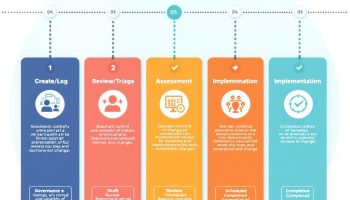
The Role of the PMO Scrum Master
The PMO Scrum Master combines traditional project management governance with agile team implementation, creating a hybrid position that drives organizational transformation. By merging strategic oversight with servant leadership, this role helps organizations transition to agile methodologies while maintaining necessary governance and alignment.
Key Takeaways:
- Integrates project management governance with agile facilitation to enhance organizational efficiency
- Serves as a crucial liaison between development teams and stakeholders
- Facilitates Scrum ceremonies while removing impediments to team progress
- Helps standardize Scrum practices while allowing team-specific adaptations
- Creates sustainability in agile practices through continuous improvement and coaching
This specialized role acts as a bridge between PMO governance structures and hands-on agile implementation. You’ll find the PMO Scrum Master balancing organizational requirements with team autonomy. Their unique position allows them to translate executive priorities into practical sprint goals.
Effective PMO Scrum Masters understand both the rigidity of traditional project management and the flexibility of agile frameworks. They don’t simply enforce processes but adapt them to fit each team’s specific needs while maintaining consistency across the organization. This balance becomes essential for companies transitioning to agile practices.
The role requires exceptional communication skills to translate between technical teams and business stakeholders. PMO Scrum Masters clear obstacles for their teams by managing external dependencies and organizational politics. They protect the team’s focus while ensuring their work aligns with strategic objectives.
Beyond daily facilitation, these professionals drive continuous improvement through retrospectives and data-driven decision-making. They identify patterns across teams that can lead to organization-wide enhancements. Their coaching extends beyond individual teams to help executives understand and support agile principles throughout the enterprise.
“The PMO Scrum Master embodies the fusion of traditional governance and agile methodologies, acting as a vital bridge that empowers organizations to thrive in transformation. By championing servant leadership and strategic oversight, they not only facilitate Scrum practices but also cultivate a culture of continuous improvement, ensuring that agility and accountability go hand in hand.”
The Integrated Role of a PMO Scrum Master
The PMO Scrum Master combines traditional project oversight with agile facilitation to create a powerful hybrid role. You’ll find this position increasingly valuable as organizations transition from waterfall methodologies to agile frameworks. A PMO Scrum Master serves as the critical bridge between project management governance and agile team implementation, ensuring both worlds operate in harmony rather than opposition.
This role ensures alignment between fast-moving Scrum teams and broader organizational goals. The PMO Scrum Master helps translate strategic objectives into actionable sprint goals while maintaining the governance needed for enterprise reporting. By mastering project leadership from both perspectives, they create an environment where agility and structure complement each other.
When functioning effectively, a PMO Scrum Master helps organizations:
- Navigate the complexity of agile transformation while maintaining necessary governance
- Standardize Scrum practices while allowing team-specific adaptations
- Establish metrics that focus on value delivery rather than just activity tracking
- Remove organizational barriers that impede team progress
- Create sustainability in agile practices through continuous improvement
Core Responsibilities in a Hybrid PMO-Agile Environment
The PMO Scrum Master handles responsibilities from both worlds, requiring a diverse skill set. Your PMO Scrum Master needs to facilitate the standard Scrum ceremonies while also addressing organizational concerns about governance and reporting.
The role includes these key functions:
- Leading Scrum ceremonies (daily stand-ups, sprint planning, reviews, retrospectives)
- Removing impediments blocking team progress
- Coaching teams on agile principles and proper Scrum implementation
- Providing project communication between development teams and stakeholders
- Managing project backlogs in collaboration with product owners
- Creating standardized reporting for organizational leadership
- Establishing metrics that balance team autonomy with organizational visibility
Organizations implementing a PMO Scrum Master position often see improved project outcomes through better coordination between teams. This role helps prevent the common problem where scope creep undermines sprint planning by acting as a buffer between organizational demands and team capacity.
The most successful PMO Scrum Masters demonstrate servant leadership while maintaining enough authority to drive organizational change. They don’t just enforce rules but help teams understand the “why” behind governance requirements. This approach creates buy-in rather than resistance and keeps the PMO Scrum Master from being viewed as just another layer of bureaucracy.
Organizations that embrace agile practices are 60% more likely to see a significant positive impact on their project outcomes, especially when leveraging hybrid roles such as the PMO Scrum Master.
www.forbes.com
The Evolution of PMO in Supporting Agile Frameworks
Project Management Offices have dramatically transformed from rigid governance structures to dynamic enablers of agile methodologies. As a PMO Scrum Master, you’ll find yourself at the intersection of organizational governance and team-level agile implementation. This hybrid role combines the strategic oversight of traditional PMO functions with the servant leadership approach essential to effective Scrum facilitation.
Organizations transitioning to agile need PMO Scrum Masters to act as bridges between enterprise requirements and agile team delivery. You’ll help select appropriate project delivery frameworks while ensuring practices remain aligned with broader organizational goals.
Modern PMOs support agile teams by:
- Managing project intake to respect team capacity limits
- Providing specialized agile training and coaching programs
- Facilitating cross-functional coordination between Scrum teams
- Establishing standardized reporting that honors agile principles
- Creating environments for continuous improvement
Many organizations are rebranding their PMOs as “Agile Centers of Excellence” to reflect this evolution. The PMO Scrum Master becomes instrumental in this transition, helping to navigate organizational change while preserving governance requirements.
Core Responsibilities in the Hybrid Role
As a PMO Scrum Master, you’ll maintain a delicate balance between governance and agility. Your primary responsibilities include:
- Facilitating all Scrum ceremonies while removing impediments to team progress
- Coaching teams on agile principles and practical Scrum implementation
- Serving as a liaison between development teams and organizational stakeholders
- Collaborating with product owners on backlog management and prioritization
- Creating measurement frameworks that focus on value delivery rather than just activity tracking
The PMO Scrum Master position requires both technical understanding and excellent active listening skills. You’ll need to translate between traditional project management terminology and agile concepts to help stakeholders understand progress and value delivery.
This evolving role demonstrates how organizations can maintain necessary governance while embracing the flexibility and customer focus of agile methodologies. By combining PMO oversight with Scrum facilitation, you create a powerful mechanism for scaling agile practices across the enterprise while ensuring strategic alignment and compliance with organizational standards.
Organizations that have adopted agile methodologies reported a 71% improvement in productivity, highlighting the critical role that PMOs play in facilitating this transformation.
forbes.com
Core Responsibilities of the PMO Scrum Master
The PMO Scrum Master combines traditional project management oversight with agile facilitation to create a powerful bridge between governance requirements and team execution. You’ll find this hybrid role increasingly valuable when implementing agile methodologies across your organization.
A PMO Scrum Master handles multiple critical responsibilities that enhance your project delivery capabilities. They facilitate all Scrum ceremonies including daily stand-ups, sprint planning, reviews, and retrospectives – ensuring these meetings stay focused and productive. When obstacles threaten team progress, your PMO Scrum Master actively removes these impediments, allowing developers to maintain momentum.
Team coaching forms another essential aspect of this role. Your PMO Scrum Master provides guidance on agile principles and Scrum practices, helping teams continuously improve their performance. They serve as a crucial liaison between development teams and stakeholders, translating technical information into business value and ensuring everyone stays aligned.
Backlog Management and Team Protection
Effective backlog management requires close collaboration between your PMO Scrum Master and product owners. Together they prioritize work items, ensuring teams focus on delivering maximum business value. This process includes:
- Maintaining backlog health through regular refinement sessions
- Ensuring user stories meet quality standards with clear acceptance criteria
- Balancing technical debt management with new feature development
- Tracking sprint metrics to measure performance and identify bottlenecks
Your PMO Scrum Master also acts as a shield, protecting teams from external distractions that could derail sprint commitments. They deflect unnecessary interruptions while still maintaining proper project communication channels with stakeholders.
The PMO Scrum Master’s role extends beyond individual teams to the organizational level. They help establish standardized agile practices that align with your company’s strategic objectives. By providing this connection between governance and execution, they ensure that agile teams don’t operate in isolation but instead contribute directly to business goals.
For complex initiatives involving multiple teams, your PMO Scrum Master coordinates cross-team dependencies and helps resolve conflicts. Their expertise in both PMO governance and Scrum facilitation makes them uniquely qualified to address challenges that span organizational boundaries.
Agile projects have a 28% higher success rate than traditional projects, emphasizing the importance of effective Scrum Masters in navigating complex environments.
hbr.org
Building Organizational Agile Capabilities
As a PMO Scrum Master, you’ll play a crucial role in developing your organization’s agile capabilities. You’ll need to bridge traditional project management governance with agile methodologies to create a sustainable transformation. The PMO Scrum Master position requires expertise in both worlds to effectively guide your company through this evolution.
Your primary responsibility involves creating comprehensive training programs that introduce Scrum concepts across departments. You’ll select and develop internal coaches who can extend agile knowledge beyond your immediate reach. This continuous improvement approach ensures agile principles become embedded in your organizational culture.
Effective PMO Scrum Masters establish communities of practice where teams share experiences and solutions. These collaborative forums help overcome common obstacles while creating standardized approaches to recurring challenges. You’ll facilitate these knowledge-sharing sessions to accelerate organizational learning and prevent teams from repeating mistakes.
Developing an Agile Coaching Structure
Your success as a PMO Scrum Master depends on creating a sustainable coaching structure. Here’s how you can build this framework:
- Identify agile champions within each department who demonstrate natural aptitude for Scrum practices
- Provide advanced training to these individuals so they can coach their immediate teams
- Create a mentorship program pairing experienced and novice Scrum practitioners
- Develop assessment tools to measure team agile maturity and identify coaching needs
- Establish regular coaching circles where PMO Scrum Masters can improve their facilitation skills
This multi-layered approach allows agile knowledge to spread organically throughout your organization. By modeling Scrum practices within the PMO itself, you demonstrate the practical application of these methodologies. This hands-on experience enhances your project leadership credibility when advising other departments.
The PMO Scrum Master must also focus on developing measurement frameworks that track agile capability growth. You’ll need to establish baselines and target metrics for team velocity, quality outcomes, and value delivery. These measurements help justify continued investment in agile transformation while identifying areas needing additional coaching support.
Your role extends beyond teaching technical Scrum practices to developing the soft skills teams need for self-organization. You’ll train teams on effective conflict resolution, collaborative decision-making, and project communication techniques essential for agile success. These capabilities form the foundation for sustainable agile practices that withstand leadership changes and organizational restructuring.
Organizations that embrace agile practices see 20-50% gains in productivity and quality.
hbr.org
Measuring Success: Metrics and Value Delivery
As a PMO Scrum Master, you need to focus on metrics that truly demonstrate value rather than simply tracking activities. This shift from traditional project metrics to value-driven measurements helps transform your organization’s perspective on success.
Effective PMO Scrum Masters establish a balanced scorecard of metrics that connect team performance to business outcomes. You’ll want to track velocity, sprint burndown, and release burnup charts to monitor team productivity, but these must be linked to value delivery indicators like customer satisfaction scores and business value realized per sprint.
A critical aspect of your role involves managing project constraints and dependencies while maintaining focus on value metrics. Consider tracking these key performance indicators:
- Sprint completion rate
- Defect density and resolution time
- Team happiness and engagement levels
- Story point delivery consistency
- Time to market for features
- Customer satisfaction ratings
- Business value delivered per sprint
These metrics help you identify where teams need coaching support. When conducting continuous improvement activities, these measurements provide objective data for retrospectives and process refinements.
Creating a process that reduces waste is equally important for the PMO Scrum Master. You’ll need to analyze workflow inefficiencies and implement improvements that eliminate bottlenecks. The PMO Scrum Master often serves as the champion for value stream mapping exercises that identify non-value-adding activities.
Sprint and Release Monitoring
Regular monitoring of sprint and release metrics helps you identify patterns that require intervention. Your role involves analyzing sprint retrospective outcomes and tracking improvement initiatives across multiple teams. When monitoring releases, focus on:
- Feature completion percentage
- Technical debt accumulation
- Quality metrics (defects, test coverage)
- Customer feedback integration
- Release frequency and predictability
By maintaining these metrics and sharing them transparently with stakeholders, you create alignment between PMO governance requirements and agile team performance. Your position as a PMO Scrum Master allows you to translate technical metrics into business value narratives that executives can understand and support.
Remember that metrics should evolve as your organization’s agile maturity increases. Start with fundamental measurements before adding more sophisticated indicators. The goal isn’t comprehensive measurement but focused metrics that drive behavior aligned with your organization’s strategic objectives while maintaining the agile mindset that the PMO Scrum Master role embodies.






